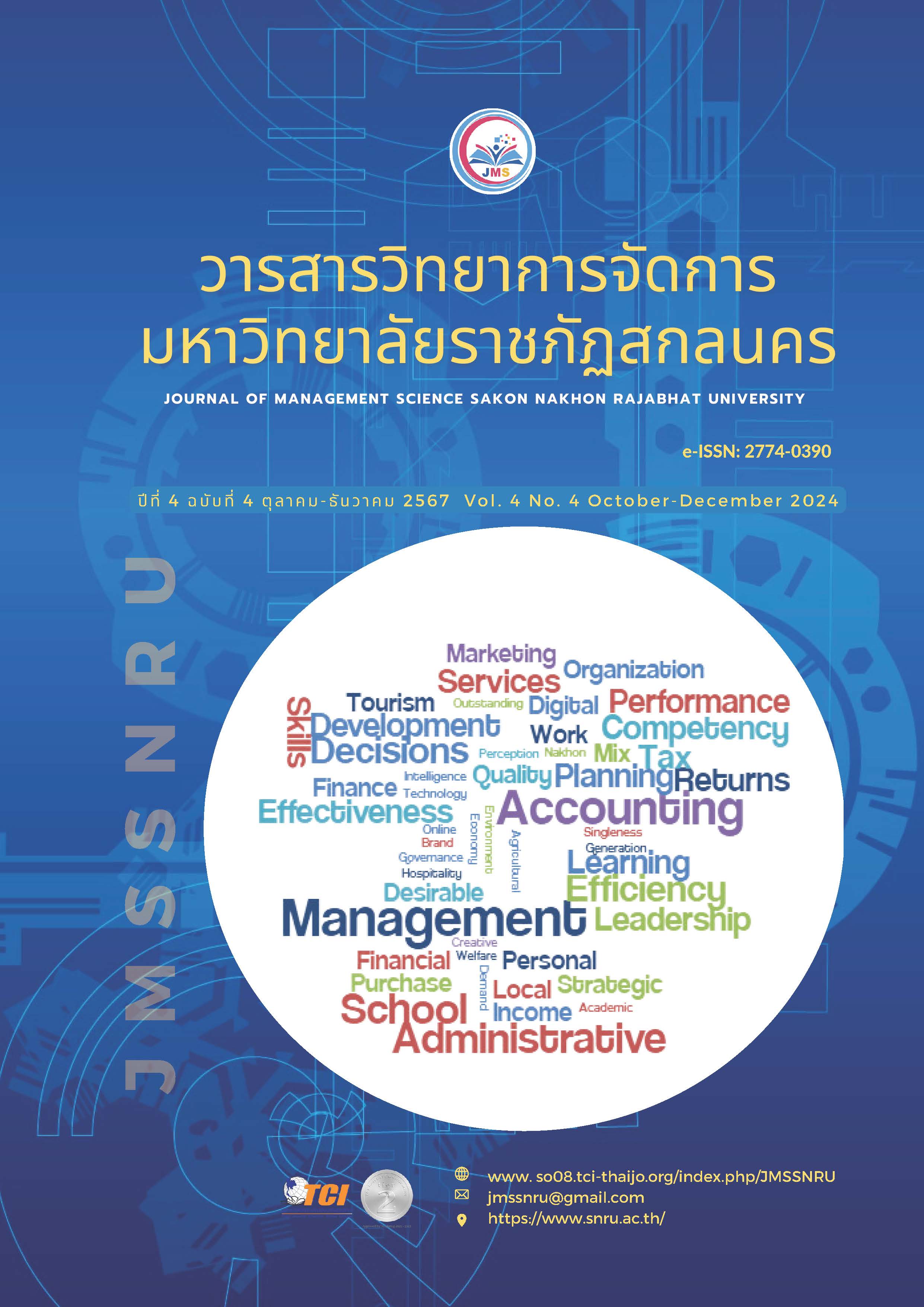THE UNIVERSE OF SINGLENESS TOWARDS DESIRABLE TOURISM AND SERVICE
Keywords:
tourism and services, singles tourism, desirable tourism, desirable servicesAbstract
The current situation of changing social structures around the world, including Thailand, has a trend of more single people. An increasing number of Thais are choosing to remain single, as indicated by data from the National Economic and Social Development Board. This change is influenced by a variety of surroundings factors, such as evolving social norms that promote singlehood. Furthermore, single people frequently have fewer financial responsibilities than those with families, which makes them a potentially significant consumer segment. They are a demographic with substantial spending power who frequently invest in personal satisfaction and experiences, such as travel and leisure services. First, this study aims to investigate the attitudes and behaviors of individuals who are single. Secondly, it is designed to explore the travel patterns and services that this demographic prefers, and it at the end identifies the specific travel and service parameters that individuals most desire. The research suggests that it is vital for entrepreneurs and industry stakeholders to understand the values and behaviors of single travelers, as this is key to the development and adaptation of tourism products and services.
References
ราชบัณฑิตยสถาน. (2554). พจนานุกรม ฉบับราชบัณฑิตยสถาน พ.ศ. 2554. สืบค้น 22 มิถุนายน 2567 จาก https://dictionary.orst.go.th.
ศูนย์วิจัยเศรษฐกิจและธุรกิจ ธนาคารไทยพาณิชย์ (SCB EIC). (2567). จักรวาลแห่งความโสด (The universe of singleness) และโอกาสทางธุรกิจก้อนโตที่ไม่ควรมองข้าม. สืบค้น 16 มิถุนายน 2567 จากhttps://www.scbeic.com/th/detail/file/product/9440/gu08ldoun2/In-focus-The-universe-of-singleness20240305.pdf.
ศูนย์วิจัยเศรษฐกิจและธุรกิจ ธนาคารไทยพาณิชย์ (SCB EIC). (2565). ส่องพฤติกรรมนักท่องเที่ยว แต่ละสายคุณเป็น สายไหน ?. สืบค้น 16 มิถุนายน 2567 จาก https://www.scbeic.com/th/detail/product/8602.
ศูนย์วิจัยเศรษฐกิจและธุรกิจ ธนาคารไทยพาณิชย์ (SCB EIC), (2566). คนโสด ๆ อยู่ทางนี้....เที่ยวอยู่ดี ๆ อาจได้คู่ กลับไป. สืบค้น 29 มิถุนายน 2567 จาก https://www.scbeic.com/th/detail/product/single-120123.
ศูนย์วิจัยกสิกรไทย (2563). โสดสายเปย์ ตลาดนี้ SME ต้องเกาะติด. K SME Analysis. สืบค้น 29 มิถุนายน 2567 จาก https://www.kasikornresearch.com/SiteCollectionDocuments/analysis/k-social-media/sme/Single_Saipay/Single_Saipay.pdf.
สำนักงานสภาพัฒนาการเศรษฐกิจและสังคมแห่งชาติ (SEA). (2567). ทำอย่างไรเมื่อประเทศไทยเป็นสังคมคนโสด ?. สืบค้น 16 มิถุนายน 2567 จาก https://www.nesdc.go.th/download/Social/Social_Report/2567_article_q1_002.pdf.
สำนักงานสถิติแห่งชาติ. (ม.ป.ป.). มาตรฐานสถิติ. สืบค้น 22 มิถุนายน 2567. จาก https://statstd.nso.go.th/definition/projectdetail.aspx?periodId=92&defprodefId=1215.
อัจฌิรา ทิวะสิงห์, สิริพร ทิวะสิงห์ และสุรพร อ่อนพุทธา. (2565). การศึกษามิติการท่องเที่ยวคนเดียวของผู้หญิงใน สังคมไทย. วารสารรังสิตบัณฑิตศึกษาในกลุ่มธุรกิจและสังคมศาสตร์, 8(1), 159-172. https://rsujournals.rsu.ac.th/index.php/jdbs/article/view/2003.
อรรถกฤต จันทร, ภูเกริก บัวสอน และชุติน แก้วนพรัตน์. (2566). แนวทางการพัฒนาการท่องเที่ยวของประเทศไทยเพื่อรองรับนักท่องเที่ยวกลุ่มที่เดินทางท่องเที่ยวโดยลำพัง (Solo Travel). วารสารบัณฑิตศึกษา มหาวิทยาลัย ราชภัฏสวนสุนันทา, 16(1), 88-111. https://so05.tcithaijo.org/index.php/ssrugraduate/article/view/262491.
Bianchi, C. (2022). Antecedents of tourists’ solo travel intentions. Tourism review, 77 (3): 780–795. DOI: https://doi.org/10.1108/TR-12-2020-0611.
Choi, S. H., Yang, E. C. L., & Tabari, S. (2020). Solo dining in Chinese restaurants: A mixed-method study in Macao. International Journal of Hospitality Management, 90, 102628. DOI: https://doi.org/10.1016/ j.ijhm.2020.102628. 14 September 2024.
Hamid, S., Ali, R., Azhar, M., & Khan, S. (2021). Solo travel and well-being amongst women: An exploratory study. Indonesian Journal of Tourism and Leisure, 2(1), 1-13. DOI: 10.36256/ijtl.v2i1.125 https://journal.lasigo.org/index.php/IJTL.
Ghai, A., & Chowdhri, S. (2022). Study On Hotel Trends Designed for Single Lady Travelers. PUSA Journal of Hospitality and Applied Sciences, 8(1), 47-61.
Otegui-Carles, A., Araújo-Vila, N., & Fraiz-Brea, J. A. (2022). Solo travel research and its gender perspective: A critical bibliometric review. Tourism and Hospitality, 3(3), 733-751. DOI: https://doi.org/10.3390/tourhosp3030045.
Yang, E. C. L., Nimri, R., & Lai, M. Y. (2022). Uncovering the critical drivers of solo holiday attitudes and intentions. Tourism Management Perspectives, 41, 100913. DOI: https://doi.org/10.1016/j.tmp.2021.100913.
Yang, E. C. L., Liang, A. R. D., & Lin, J. H. (2023). A market segmentation study of solo travel intentions and constraints. Journal of Hospitality & Tourism Research, 10963480231163517. DOI: https://doi.org/10.1177/10963480231163517.
Downloads
Published
How to Cite
Issue
Section
License
Copyright (c) 2024 JOURNAL OF MANAGEMENT SCIENCE SAKON NAKHON RAJABHAT UNIVERSITY

This work is licensed under a Creative Commons Attribution-NonCommercial 4.0 International License.
An article published in the Journal of Management Science. Sakon Nakhon Rajabhat University is the opinion, copyright and responsibility of the author of the work.







